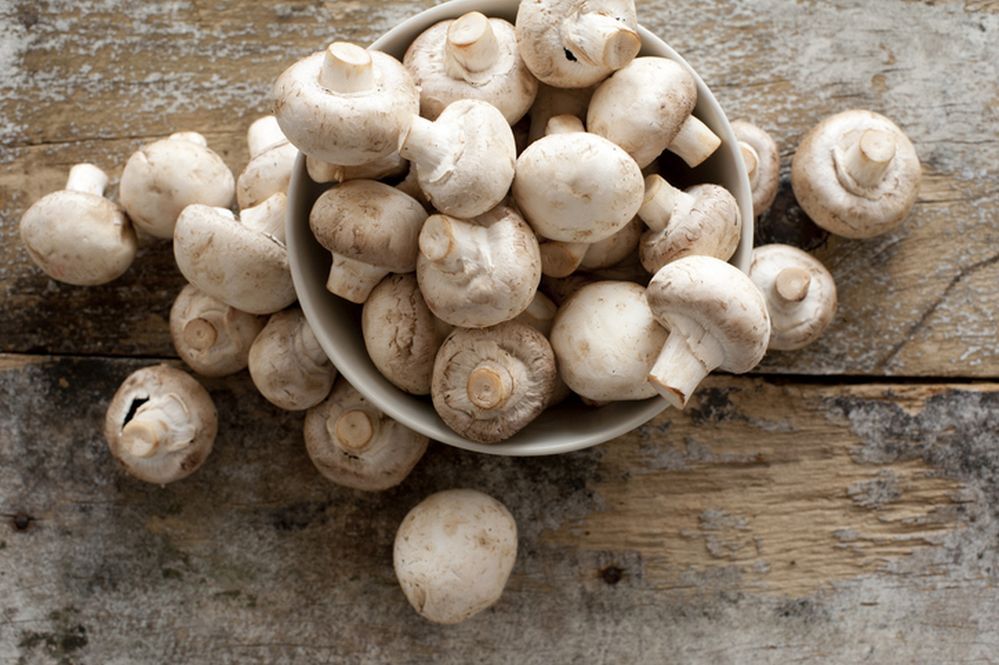Chinova Bioworks, a Canadian startup producing natural preservatives and fining agents from upcycled mushroom stalks, is expanding its capacity four-fold this year to fuel international expansion and meet demand in fast-growing markets such as non-alcoholic beer.
[Disclosure: AFN’s parent company AgFunder is an investor in Chinova Bioworks.]
Founded by David Brown (COO) and Natasha Dhayagude (CEO) in 2016, Chinova is best-known for its Chiber natural preservative, which can replace synthetic preservatives in a wide variety of food and beverages. It has also developed a vegan fining agent called MycoKleer to clarify beer, juice, and other beverages.
According to Chinova’s GRAS notice, Chiber contains 96% chitosan and 5% beta-1,3-D-glucans and is effective against a wide array of spoilage microorganisms (bacteria, yeast, and mold). Labeled as ‘mushroom fiber,’ it is heat-stable and effective at pH levels of 2-6.5.
While its mechanism of action has not yet been fully elucidated, the predominant theory is that the positively charged chitosan interacts with the negatively charged cell membrane of the spoilage microorganisms, which eventually leads to cell death.
‘Over the last year we’ve become cash positive’
Chinova, which has raised C$12.1 million ($9 million) over the last six years in VC funding and around C$2.5 million ($1.9 million) in grants and awards, is funding the expansion at its production facility in Prince Edward Island “entirely from revenues,” Brown told AFN.
“Over the last year we’ve become cash positive, generating enough revenue that we’re funding this expansion entirely on our own without using any more investment capital. This year we are expecting to double the volume we did last year, and last year was already a great year.
“We’re expanding into Australia and New Zealand with a distribution partner and then getting into Asia and South America. And we’ve only really scratched the surface when it comes to North America.
“It’s been an incredible year so far. I think maybe five years from now we’ll be a $100 million a year company and continuing to innovate with natural sustainable ingredients. We are up to 35 people now and by the end of this year, we plan to get up to around 50.”
But he added: “We’re not a Silicon Valley company that is trying to raise $100 million and hire hundreds of people really fast, we’re growing rapidly but we’re very methodical and sustainable about it.”

‘Every big beer producer is coming out with a non-alcoholic version of its beer’
One key area of opportunity for Chiber right now is non-alcoholic beer, said Brown. “Once you take away the alcohol, these products are prone to spoilage, but brewers don’t want to use synthetic preservatives. As a result, some brands tunnel-pasteurize the beer, but that mutes the flavor and the beer doesn’t taste fresh and crisp anymore. It also limits how much you can carbonate it.
“We’ve done a lot of studies with non-alcoholic beer producers showing that Chiber can get them the same shelf-life that they would with tunnel pasteurization, with none of the downside. So you get no muted flavors, and you keep the carbonation levels people are looking for.
“We are working with early adopters, and a few are hoping to launch within the next two months. This is a big opportunity as every big beer producer is coming out with a non-alcoholic version of its beer, so it’s a really exciting time.”
He added: “The main problem in these products is yeast, which creates alcohol, and they can’t go over 0.5% alcohol or the product is considered adulterated, so manufacturers are really wary about yeast growth. But mold and bacteria also grow easily in beers once you take away the alcohol.”
There are also opportunities for Chinova to work with hard kombucha brands, where companies are experimenting with a smaller dose of Chiber to keep yeast and bacteria in check without completely killing it off, he said.

Shelf-life extension for plant-based dairy products
Another growth area is plant-based cheeses and yogurts, where companies that have not historically used any preservatives in order to retain their clean label credentials are using Chiber to extend shelf-life, said Brown.
“Plant-based cheeses made with nuts can come with quite a high microbial load of yeast and molds that can be very heat resistant, so you get a big challenge on shelf-life. Most of the customers we work with have not been using antimicrobial preservatives because they want to keep their clean label, so they can have a terrible shelf-life.
“One of our biggest clients makes almond based cream cheese and we were able to extend its shelf-life from six weeks to 14 weeks with no mold growth.”
Vegan fining agent
Fining agents—ingredients that clarify beverages such as beer and wine—are typically classified as processing aids, and don’t have to be labeled. However, many companies are under pressure to avoid synthetic or animal-based ingredients at every step of their manufacturing process, regardless of whether they appear on the label, which is driving interest in natural alternatives, said Brown.
“People don’t like it when they find out their beer is clarified by fish bladders.”
Chinova’s vegan fining agent MycoKleer binds with yeasts, tannins, proteins, and other unwanted particles in beverages from tea and juice to cider and beer, and can replace synthetic and animal-based fining agents including silica, PVPP, bentonite, isinglass, and gelatin, said Brown.
“In cider and seltzers, we’re finding that MycoKleer outperforms some fining agents such as PVPP, Kieselsol (silica) and bentonite.”
In some cases, it can also reduce the number of mechanical filtration steps required to achieve a clear beverage, claimed Brown.
“We’re working with a lot of craft breweries, distilleries, cideries and wineries including a local company [Moonshine Creek Distillery] which was using a costly and labor-intensive filtration process to reduce haze and sedimentation in its top-selling Apple Crumble cocktail.”
For Moonshine Creek, using MycoKleer speeded up the production process and saved money by reducing the number of filtration steps and allowing the company to retain more product per batch, he said.
“Sometimes, depending on the beverage, MycoKleer can replace both [filtration and fining agents]. Sometimes it just makes things easier, so rather than using three or four filters before using a final polishing filter, you can go straight to the polishing filter and really streamline the process.”
There are also growing opportunities beyond alcoholic beverages, he added: “We originally thought the only people who would be interested were brewers, but we’re now working with a giant juice producer in Brazil, which is going to use MycoKleer to clarify some of its juices.”
The innovation pipeline
In some cases, technologies such as vacuum packing, aseptic packaging or high-pressure-processing (HPP) have enabled companies to avoid preservatives altogether (think premium juices and some hummus brands).
But where they are needed, brands that want to maintain their ‘clean label’ credentials are increasingly shifting towards natural options, as synthetic preservatives are added to more companies’ ‘unacceptable ingredients’ lists, creating big opportunities for players such as Chinova, said Brown.
“We’re expanding our sales team to take our [existing] ingredients into more markets, but we’re also investing a lot into research and working on exciting new natural ingredients that we hope to launch in the next couple of years.
“We’re focusing primarily on mushrooms, but we’re also looking at other plant materials.”





